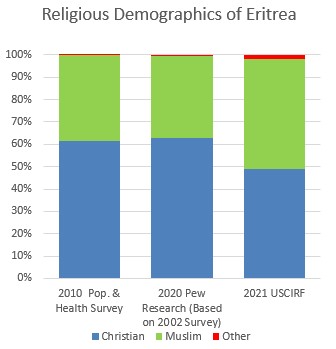
Religion in Eritrea
Religion in Eritrea consists of a number of faiths. The two major religions in Eritrea are Christianity and Islam. However, the number of adherents of each faith is subject to debate. Estimates of the Christian share of the population range from 47% and 63%, while estimates of the Muslim share of the population range from 37% to 52%.[1][2][3]
Most Eritrean Christians belong to the Eritrean Orthodox Tewahedo Church, although a minority is affiliated with the Eritrean Catholic Church and various Protestant denominations, respectively.[3][1] Eritrean Muslims are predominantly Sunni.[3]
Apart from the officially recognized denominations of Christianity and Sunni Islam, all other faiths and denominations are in principle required to undergo a registration process; in practice they are not allowed to register.[4] Among other things, the government's registration system requires religious groups to submit personal information on their membership to be allowed to worship.[4][5][6][7][8]
Religious affiliation by geography and by ethnic group[edit]
According to a 2018 report from the United States Department of State, the population in southern and central Eritrea is primarily Christian, while the population of northern Eritrea is primarily Muslim. According to that same report, the Tigrinya ethnic group are primarily Christian, while the Tigre and the Rashaida groups are primarily Muslim.[24]
The majority of Christians are found in the Eritrean Highlands found in southern, central and parts of northern Eritrea. A majority of the Tigrinya who constitute almost 60% of the population are Christian. The majority of the Kunama are Catholic, with a small minority of Muslims and some who practice traditional indigenous religions. Approximately 40% of the Bilen are Christian, the majority being Catholic.[19]
The majority of Muslims in Eritrea inhabit the eastern, coastal lowlands as well as the western lowlands near the border with Sudan. Most belong to various Afro-Asiatic communities, especially the Tigre, Saho, Afar, Rashaida, Beja and Bilen ethnic groups.[19] About 5% of the Tigrinya are also Muslims; they are known as the Jeberti, though they claim a different ethnic background from the Biher-Tigrinya; the Rashaida are an Arab tribe who migrated from the Hejaz region of Saudi Arabia in the 19th century. Additionally, the majority of the Nilo-Saharan-speaking Nara ethnic minorities also adhere to Islam, as do some of the Kunama Nilotes.[25]
Legal framework and restrictions[edit]
The Eritrean constitution provides for the freedom of thought, conscience, and belief; and guarantees the right to practice and manifest any religion. The constitution has not been implemented since its ratification in 1997. Since the constitution has not been implemented, the Proclamation to legally standardize and articulate religious institutions and activities is provided in Proclamation No. 73/1995 of 1995. Although Proclamation No. 73/1995 clearly enshrines the strict principle of secularism, it also states that every Eritrean national's right of freedom of thought, conscience and belief is guaranteed and respected by the law.
However, Proclamation No. 73/1995 also defines that: 1) religious activities are not spread with seduction but with understanding and belief (thus explaining the hostile stance toward new religious movement and evangelical Christian group proselytism); and that 2) religious activities are carried out in accordance with and respects the law of the nation and particularly preserves the peace, stability, and unity of the people and the country.
Moreover, the Proclamation is also clear on the fact that (due to the secular principles) the relation as between the government and religion and religious institutions, as well as policies that deal with religious institutions should be formulated in accordance with the law. Pursuant to this Proclamation there is the establishment of the Department of Religious Affairs within the Ministry of Internal Affairs. This is tasked with regulating religious activities and institutions. The Proclamation emphasizes that religions and religious institutions must not engage in political activities or comment on political issues which would hamper the secular character of the State. The decree additionally prohibits religious groups from initiating or offering social services based on sectarian parameters.
The Proclamation requires religious groups to register with the government or cease activities. Members of religious groups that are unregistered or otherwise not in compliance with the law are subject to penalties under the provisional penal code. The Office of Religious Affairs has authority to regulate religious activities and institutions, including approval of the applications of religious groups seeking official recognition.
Religious groups must renew their registration every year. In 2002, the Roman Catholic Church and the Evangelical Lutheran Church of Eritrea (affiliated with the Lutheran World Federation) were required to submit registration applications and cease religious activities and services until applications were approved.
Treatment of unregistered religious groups[edit]
On 25 October 1994, the government revoked the business licenses of Jehovah’s Witnesses due to their refusal to recognize “the temporal government” and take part in the referendum on independence. Jehovah's Witnesses have also refused to participate in national service. Political neutrality and conscientious objection to military service are key aspects of faith for Jehovah’s Witnesses. While national service in Eritrea does include a civil component, all Eritreans are required to undertake military training and Eritreans cannot generally choose which type of service they will perform. Since the decree was issued, Jehovah’s Witnesses have been barred from obtaining government-issued identity and travel documents (required for legal recognition of marriages or land purchases); or obtaining government jobs; as well as securing business licenses.[26]